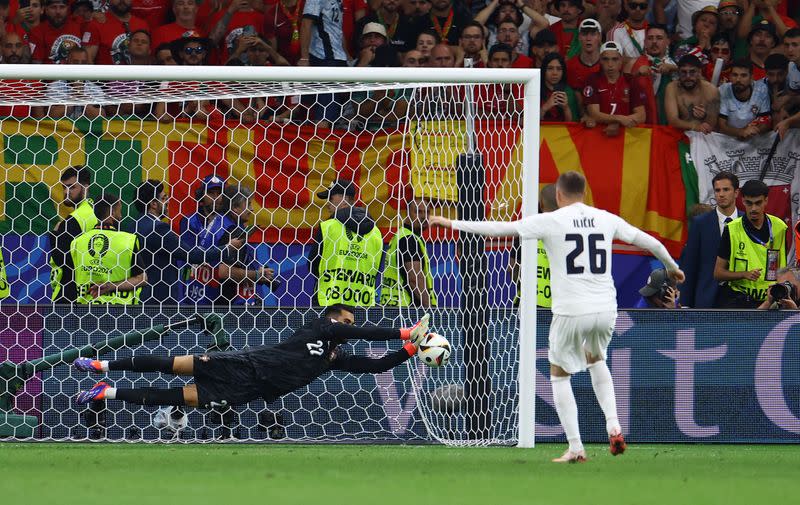Soccer-With holograms, AI and big data, football front and centre in tech race

By Martin Petty
DUESSELDORF, Germany (Reuters) - After Benjamin Verbic missed Slovenia's third successive penalty in this week's Euro 2024 second-round shootout against Portugal, he described football's ultimate test as a lottery.
All three penalties were executed similarly and drew three near-identical saves by Portuguese goalkeeper Diogo Costa, who each time initiated his dives just before the ball was struck.
Switzerland-based neuroscientist Jean-Pierre Bresciani believes penalties are not entirely a game of chance, but something that can be improved through training, including the ability to react faster to redirect a spot kick when a goalkeeper moves first.
His research team at the University of Fribourg has designed a simple and portable training ground tool they say can sharpen players sensory motor skills by 28%, and could boost their conversion probability by more than one third, based on their trials.
The team had professional players take penalties on a regular pitch against a holographic goalkeeper whose appearance and movements mimic those of top-level keepers.
Connected to augmented reality eyewear, the software randomly gives the penalty-taker a target location. Just before the ball is struck, the hologram keeper initiates a dive, requiring the taker to follow through on the prescribed path, or quickly re-adjust and send the ball the other way.
The system was tested on 13 youth players age 16-18 from clubs FC Basel and FC Luzern, among them eight Swiss junior internationals, who undertook 10 sessions of 20 penalties using the simulator.
All players significantly cut their response times, or sensory motor threshold, with the average reduction from 429 milliseconds to 309 milliseconds, a deficit researchers say could boost the chances of conversion by 35% if maintained through training.
"I know it works because we measured it, it can be a very useful tool," Bresciani told Reuters, adding an earlier, lab-based study by the research team involving about 100 players showed the same trend.
"They consistently had better responses," he said. "We improved the sensory motor threshold. What we improve is the brain's ability to use visual information about the goalkeeper to steer the kick faster and more efficiently."
The tool cannot replicate fatigue or the psychological pressure of a shootout situation, but could improve players' level of preparedness, according to Bresciani, with the potential to transfer the concept to other areas of the field where quicker responses could be game-changing.
The software's algorithms are optimal in responding to each players' improvements, or fatigue, by adjusting the timing of the goalkeeper's move to maintain the same level of difficulty.
Bresciani said its advantages were its precision and compactness, with very little equipment needed, while the holographic goalkeeper's dives can be programmed to the millisecond, which a real "training goalkeeper" cannot replicate.
INTEL-DEPENDENT
Goalkeepers moving before the point of contact with the ball is nothing new, but their decisions are increasingly informed by data analytics, with firms providing teams with statistical insights on the techniques and penalty preferences of takers.
Germany's team at Euro 2024 has the backing of software group SAP in getting the inside track on opponents, with match analysts feeding coaches and players with insights directly to tablets and smartphones via applications with messaging to discuss findings.
The team, according to SAP, has access to data right up to kickoff, shaped by the opposition's starting lineups, including annotated video visualisations and analysis of key players.
Crucially, the software provides data specific for penalty shootout scenarios, with intelligence on the behavioural patterns of takers and goalkeepers, including whether some players' penalty preferences might change under pressure.
SAP told Reuters it could not provide data or specifics on how the software has been used tactically by the German team during the tournament.
The German federation is looking ahead at artificial intelligence having been introduced to prototypes it hopes can help scouting by mining data on an average 1,500 games per season and also make it easier to compile analytics for its national teams to prepare for games.
"That would minimise the manual tasks our match analysts need to complete and reduce the time it takes to get answers to a range of key questions we have when preparing for games," Martin Vogelbein of the federation's Scouting, Match Analysis, and Diagnosis team, said in a statement.
(Reporting by Martin Petty; Editing by Christian Radnedge)


